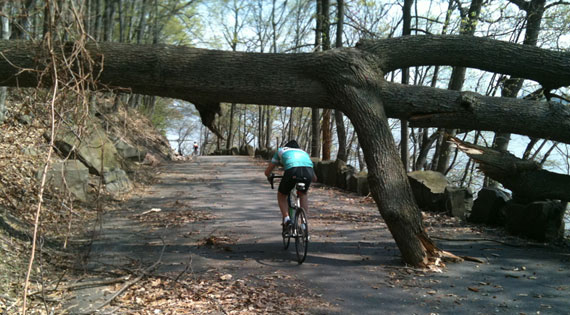Work crews will soon start clearing dozens of downed trees from Henry Hudson Drive, the New Jersey road whose spectacular vistas and challenging hills have made it a prime destination for New York-area cyclists. If all goes well, it may re-open as early as next month. But the scale of the devastation along the eight-mile route from Edgewater to Alpine, just across the George Washington Bridge, is adding weight to concerns over the impact of climate change on landscape and infrastructure.
The drive, known colloquially as River Road, was constructed in the 1920s and 1930s but was only opened officially to full-time cycling in 1989, after a two-year advocacy campaign led by Transportation Alternatives. Winter or early-spring rockslides have closed the road a handful of times since then, but in specific locations that were repaired within weeks.
The situation this year is far different. According to Chris Szeglin, a spokesperson for the Palisades Interstate Park Commission, "two big storms, back to back, a huge snowstorm in late February and the ‘silent hurricane’ in March," weakened and ultimately uprooted hundreds of trees. One cyclist who skirted a barrier at the Englewood Cliffs entrance on Sunday and made it to the north exit at Alpine reported having to carry his bike over fallen trees "20 to 30 times."
The rugged topography that makes River Road so spectacular obviously leaves it vulnerable to erosion and rockslides. Here is where global climate change may be coming into play.
Climate models predict that the increased thermal energy in a warming atmosphere and warmer oceans should produce more violent storms. And sure enough, "extreme weather events" -- defined as an inch or more of rainfall (or equivalent snow) within a 24-hour period -- are growing more common.
A University of New Hampshire study released last week [PDF] found that over the past 60 years such events have become more frequent at 92 percent of Northeast U.S. weather stations. With runoff rates also rising as natural areas are paved over, trees are being inundated with more water than they have evolved to withstand.
Just as most individual instances of cancer can’t be tied directly to exposure to a particular air toxin or water pollutant, the current devastation on River Road can’t be definitively linked to global warming. Nevertheless, at least in statistical terms, the closure of the road and the loss of so many beautiful trees can probably be taken as yet another consequence of the unchecked buildup of heat-trapping gases in the atmosphere, primarily from the burning of fossil fuels.






